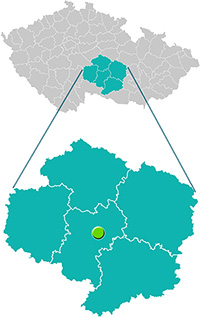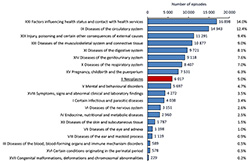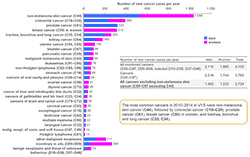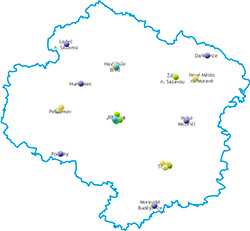



Vysočina Region
General characteristics: an overview of history and demography

The Vysočina Region is an administrative unit of the Czech Republic, located on the border of historical regions of Bohemia and Moravia. The Vysočina Region is divided into five districts, namely: Havlíčkův Brod District, Jihlava District, Pelhřimov District, Třebíč District and Žďár nad Sázavou District.
The Vysočina Region was established on 1 January 2000 by the Fundamental Law No. 347/1997 Coll. by joining three districts of the former South Moravian Region, one district of the former East Bohemian Region, and one district of the former South Bohemian Region. Since the very beginning, the newly created region had to face many problems that emerged from an artificial connection of areas that had formerly belonged to three various regional centres. The declared “natural catchment area” of Jihlava, the newly created capital of the Vysočina Region, was a wishful thinking rather than reality. All these problems affected health care as well, including cancer care. The doctrine imposed by former regional management, who intended to develop five equal regional hospitals that would compete with each other, also had a negative impact on the development of network of health care providers and mutual relations. This trend was enforced even in 2008 – at the time when Comprehensive Cancer Centres were being developed – and a gradual change has been under way only in recent years.
The Vysočina Region has 510,520 inhabitants, out of which 253,218 (49.6%) are men and 257,302 (50.4%) are women (data from 2013 census). Population of the Vysočina Region accounts for about 5% of the entire population of the Czech Republic. The population density is very low, with the number of inhabitants per square kilometer (75.1) hardly reaching 57% of the national average. A dispersed settlement is a characteristic feature of the Vysočina Region: there is a large number of small municipalities.
Comprehensive cancer care
The comprehensive cancer care works very well in the Vysočina region: from preventive screening programmes to diagnosis, treatment and follow-up. The Comprehensive Cancer Centre is located in Hospital Jihlava, which therefore serves as the catchment centre for a more demanding and specialised cancer care, whereas other regional hospitals largely contribute to the basic care.
Authorities of the Vysočina Region established five regional hospitals, which provide cancer care in various extent and volume. This structure is supplemented by a private outpatient facility focused on medical oncology in Třebíč, as well as numerous smaller private facilities, which deal primarily with cancer diagnosis, prevention, and palliative care. At the time of development of cancer care in the Vysočina Region, it was necessary to take into account that the region actually has no natural catchment centre such as a university hospital or central hospital, and that subjects dealing with cancer care were developing independently of each other for a long period of time, and that they had relations to three various catchment centres. In 1998, hospitals in the Vysočina Region signed the Declaration of Establishing the Comprehensive Cancer Centre of the Hospital Jihlava and the Cooperating Group Vysočina; this was carried out under the auspices of the Czech Society for Oncology.
The diagnostic and therapeutic care of adult patients with solid tumours is provided by facilities that fulfil strict personnel, technical and organisational criteria. The specialised care is provided by the Comprehensive Cancer Centre (CCC; the status is granted by the Ministry of Health), while the basic care is provided by health care facilities within its sphere of activity, which form the Cooperating Cancer Care Network (CCCN) and cooperate closely with CCC.
The concept of cancer care in the Vysočina Region covers the following types of facilities dealing with cancer care: diagnostic specialties (imaging, endoscopy, laboratory), surgical specialties, radiation oncology, medical oncology, haemato-oncology; additionally, there are facilities dealing with follow-up, palliative care and secondary prevention, including cancer screening programmes.



 View the official presentation of the comprehensive
View the official presentation of the comprehensive
